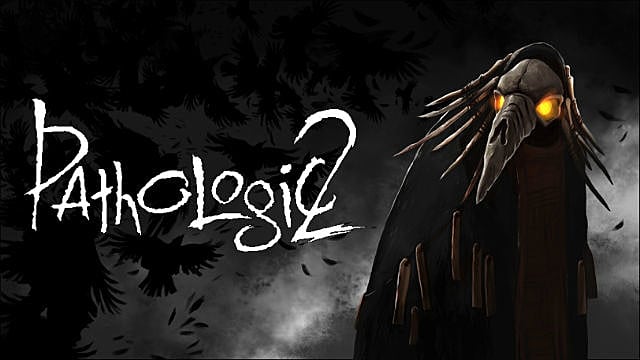

Crowdfunding has seen the resurgence of many classic series, from The Bard's Tale and Wasteland to tiny niche excursions like the 2005 psychological horror title Pathologic.
A complete re-imagining of the original entry with modern graphics, Pathologic 2 is about to hit the gamingverse like an atomic bomb. It's destined for controversy as players debate what actually constitutes a "game" versus an artistic experience or social statement — and just how unpleasant a game can be before it stops being a game.
There are some superficial similarities in overall gameplay to something like We Happy Few, where you are in a sandbox FPS/horror hybrid trying to solve problems, but make no mistake, what's in store for you here is significantly more messed up in every conceivable way.
For starters, Pathologic 2 teaches you how to use the trading system by having you reach into your chest and pull out your rotting heart to swap it for a healthy one -- after you've beaten a guy into submission to prove you deserve it.
Needless to say, this will be an acquired taste for a niche crowd, and its clear the developers see Pathologic 2 as more as a form of art than a diversion for turning your brain off and gunning down some enemies after work.
Relentlessly Bleak And Actively Unpleasant
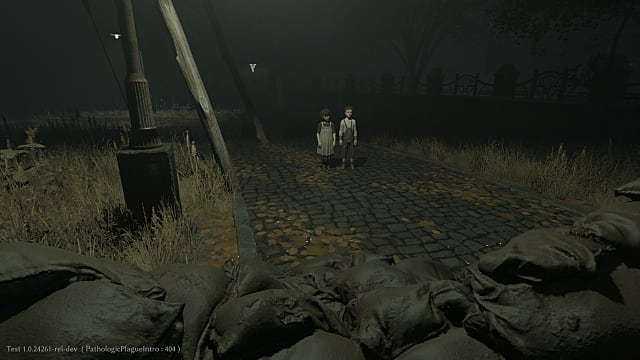 This isn't Bethesda; you better believe you can kill and rob kids.
This isn't Bethesda; you better believe you can kill and rob kids.
Even for people who are going to love the aesthetic and atmosphere, this is a game that's incredibly hard to rate, because while the end product is polished and engaging, it's not particularly enjoyable — and that's on purpose.
This third of the game (and more on that debacle below) has you playing a surgeon arriving back home after a receiving a letter from your father and finding you have 12 days to resolve a plague.
Pathologic 2's story isn't horror in the sense that some demonic creature is stalking you through the halls of an asylum or zombies are chasing you through a mansion. Instead, this is more "true" horror based on the uncaring ravages of disease, fear of the unknown, and a growing sense of the awful things people will do to one another when everyday life gets thrown in disarray.
The story and gameplay are bleak to the point of no longer being entertainment in any sense of the word.
To be clear, I'm not opposed to relentlessly bleak storytelling — I authored a black as death grimdark novel myself — but combined with the unforgiving survival mechanics, the extremely avant-garde take on storytelling, and the number of hours you'll be investing, this is a game that's hard to play for long stretches.
That overarching purpose of why you are in the town frequently has no connection to what you are actually doing on any given day. The game's opening half hour is just a straight up fever dream that's meant to be disorienting and leave you with no clue of what is going on.
Things become (slightly) more coherent when you actually enter the city and start the 12-day countdown, but don't expect nearly anything to make literal sense or have a clear cut explanation.
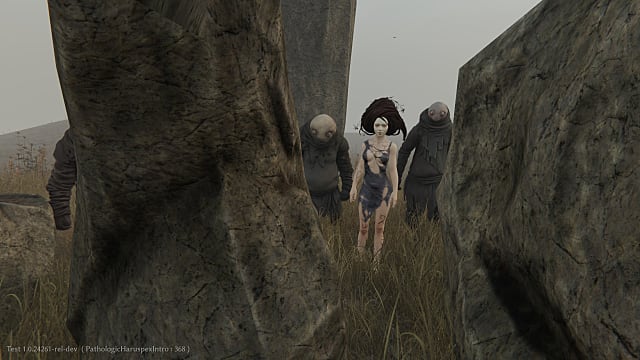 This is fine, there's nothing out of the ordinary going on here.
This is fine, there's nothing out of the ordinary going on here.
Narrative incoherence aside, this is a game that is openly hostile towards you in multiple ways. And by "you," I often literally mean you, not the main character.
A segment during the insane opening vignette really drives that point home as you loot drawers to find items for trading or healing wounds. The more containers you open, the more a series of disconnected voices laugh at you, getting increasingly more raucous as you take items that you're coming to understand won't be in your inventory when the dream ends.
Open mockery is only the beginning of the ordeal you're in for, however, as Pathologic 2 is filled with tough choices meant to test your moral integrity, both in terms of the overall story and even just in the general gameplay.
Some events only take place at night for instance — and you'll want to keep working through the night hours to save this city from doom — but going out at night is a uniformly terrible idea, since you'll lose out on dreams, be more exhausted, and almost certainly get attacked by raving lunatics.
Even going out in the day as the plague drags on becomes increasingly more of a dangerous proposition, and there comes a point where you ask yourself — is crossing this district going to be worth the food and healing items I'll have to use on myself if I can't even help anyone on the other side when I get there?
Having those sort of quandaries baked into the gameplay reinforces the actual story-based decisions as the situation becomes more desperate.
The game opens with the Haruspex having to kill three men in self-defense. Before long you'll have to start asking yourself if killing people for food counts as "self-defense," or if killing people to study their organs and prevent thousands of deaths via plague can be justified in the same way.
Upgrades From The Original
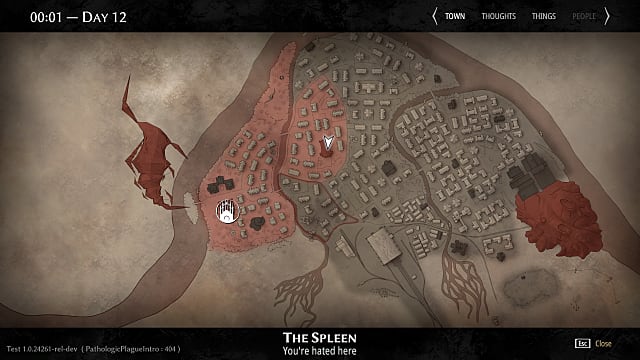 If they'd called it "The Liver" it would have been much more accurate!
If they'd called it "The Liver" it would have been much more accurate!
For those who played the original entry, the broad strokes are still the same. Many of the same characters, locations, and plot points are present. Some elements are actually given to you more early on to drive the key points home in your brain.
There are big improvements from the original on the graphics front, however, and much better mechanics coupled with major quality of life improvements utilizing modern UI elements that gamers have come to expect in 2019.
Not everything got an upgrade, though. Manual saving at specific locations is going to tick off people who didn't play the first one and aren't expecting that throwback to an earlier era of gaming.
Some features have been made slightly easier based off fan feedback from the alpha test, but make no mistake — you're still in a major fight for your life on all fronts at all times, whether that's from starvation, disease, or an actual knife fight.
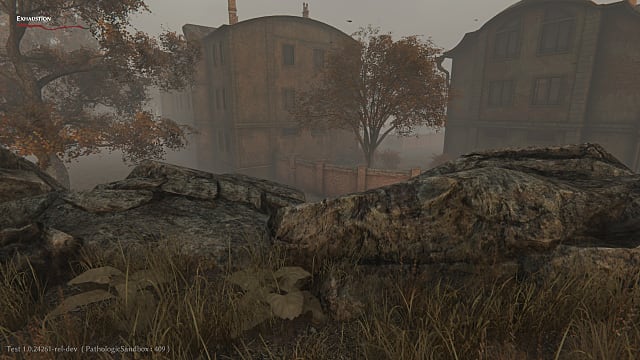 You can't jump up on these rocks and drop down to the area below.
You can't jump up on these rocks and drop down to the area below.
Other than the manual saving, the only real problem with this updated version of the game is that its much less of a "sandbox" experience than the developers have implied. Tiny rocks or knee-high level walls block your path, and districts are heavily segmented from one another.
While the environment is a fairly large city with lots of places to explore and different events occurring at various times and dates, calling it "open world" might be a bit of a stretch. Much of the environment will be closed off at any given point, either because the locals hate you and won't let you in, or because whole districts are too dangerous to traverse on later days.
That being said, Pathologic 2 does an incredible job of creating an unpleasantly organic feel in the town, from the area names to the way the streets and thoroughfares are setup like uncomfortably tight veins pumping you from this section to that section.
Those visuals are propelled by a soundtrack that is absolutely spot on, offering a very weird and uncomfortable soundscape as you explore the city.
So, What The Hell Is Actually Going On In This Story?
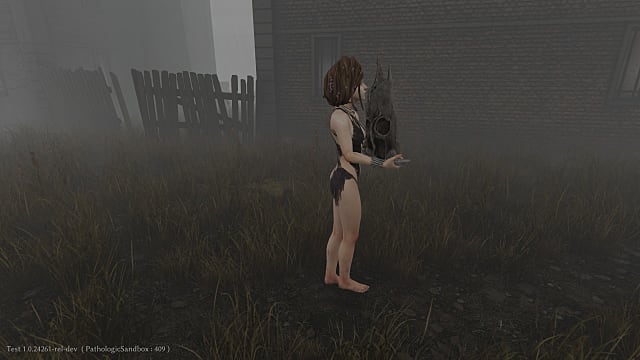 An herb wife making out with a bull skull is just par for the course in this game.
An herb wife making out with a bull skull is just par for the course in this game.
While helping a gang of kids or trying to find people to clear your name for murder, you will come across just flat out insane events and characters.
Giant bulls, women made of clay who may or may not be responsible for murders, a groaning and angry earth, children with no parents who wear dog masks and speak more cryptically than Bran from Game Of Thrones... this is a bizarre acid trip of a game that is open to interpretation.
Even the name Pathologic is clearly meant to be interpreted in different ways, both directly in terms of the physical virus, and indirectly in terms of a mental condition.
So what's actually happening here, and what is the main character doing during the course of these 12 days? I don't think there's meant to be one definitive answer, but here are some best guesses without spoiling too much of the story:
- It could all be a stage play taking place in the protagonist's fevered mind, and that's a theory propelled by constant theatrical references all across the game.
- It's also possible the game itself is a statement directly to you the audience, with the bird-headed executors routinely breaking the fourth wall and talking to the player.
- Conversely, the constant meat, blood, and animal references could mean this is all an allegory for a dying earth and an even sicker humanity.
- There could be something more esoteric and occult going on and all the Russian folklore elements are meant to be taken more literally.
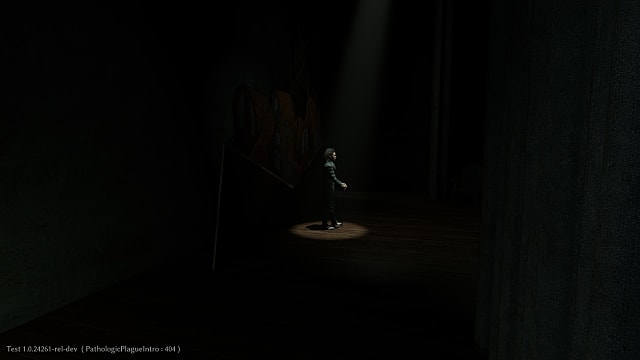 Is it all a play going on in your head? Who knows?
Is it all a play going on in your head? Who knows?
I bring up these possibilities because it's important to know ahead of time that you aren't destined to get a satisfying, conclusive answer to anything here.
Honestly, I find it unlikely that even the developers could give anyone a straight answer and explain in sane terms "This is definitively what is actually happening in the game."
I mean sure, there are plenty of people who have come up with theories as to just what in the hell was going on in Eraserhead or Black Swan, but those are just people vainly grasping for meaning in a sea of the bizarre and the meaningless.
The Bottom Line... And A Question Mark On The Ending
Pros:
- The atmosphere, visuals, and soundtrack are something you won't find in any other game
- Moral quandaries here have significantly more impact than in most games
- The upgrades from the original title are well worth it for existing fans
Cons:
- Story and dialog are incoherent to a wild degree
- Feeling suicidal lately? For the love of everything, don't play this game
- You only get a third of the experience... and the other parts may never arrive
Here's the thing: if you want a straightforward game with a coherent narrative that goes from A -> B -> C, this isn't for you. If you want a jump scare-laden defenseless horror game, this is also isn't for you. If you want a full open world experience where you can do whatever you want without restriction or timelines, again, this game isn't for you.
On the other hand, if you're willing to try something different and see how gaming can be its own art form just as compelling as film or literature, Pathologic 2 may be worth your time, so long as you can deal with constantly being emotionally drained.
Frankly, anyone suffering from depression, mental illness, or with a history of drug abuse probably shouldn't play this game at all.
There's one other nagging issue here that has to be brought up as well, and that's the big old question mark on how the other two-thirds of the game will arrive.
Wait, what's that you say? The game is missing a full two thirds?!?
Yep, the Haruspex is only one of three characters from the first game. Those other two characters — which haven't been implemented yet — are necessary to absorb the whole narrative, because you're only seeing the events unfold from one point of view. That limited one character viewpoint makes an already bizarre and non-traditional game basically incomprehensible.
Here's the kicker: the developers haven't decided yet how or when the other two chapters will arrive. We do know that backers of the Kickstarter campaign get them for free. Everyone else may have to buy them as DLC. It's entirely unclear, and they may never show up at all if Pathologic 2 doesn't sell well.
So here I'm left in an uncomfortable position (which the developers would probably love). This game flat out isn't enjoyable, and it's hard to recommend a game that has a very real possibility of never actually being finished. Even worse, if the other two chapters do arrive, I'm not sure I'd want to return to this awful bleak wasteland and endure the experience again two more times.
Is Pathologic 2 a triumph of artistic expression showcasing how games don't have to follow a formula and can more than you expect? Unquestionably, yes! Do I ever want to load it up again, though? Hell no.
[Note: A copy of Pathologic 2 was provided by tinyBuild Games for the purpose of this review.]
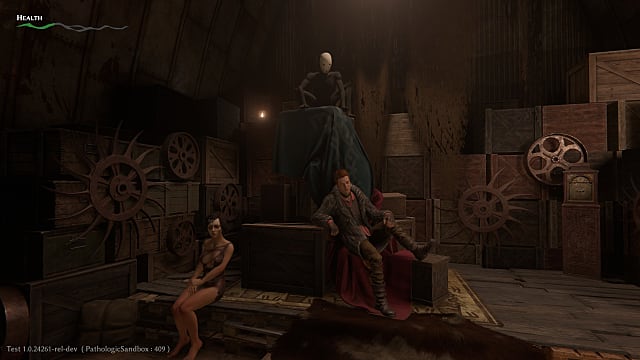
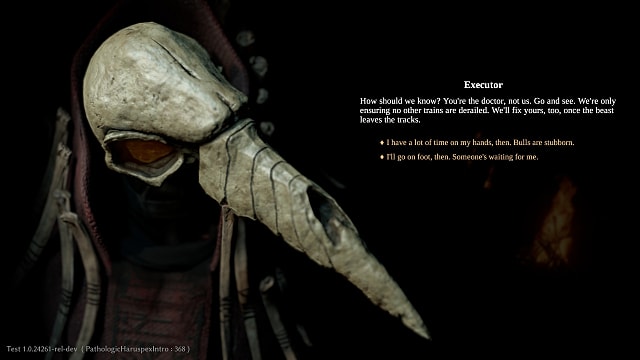
0 comments:
Post a Comment